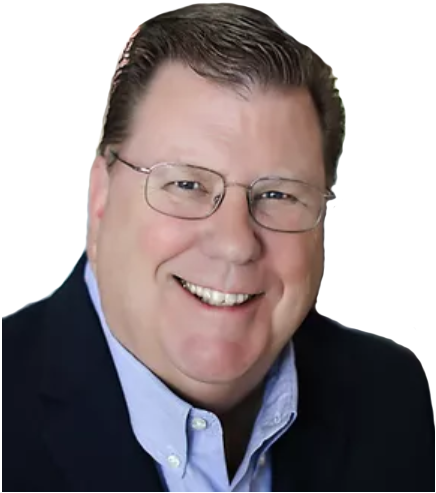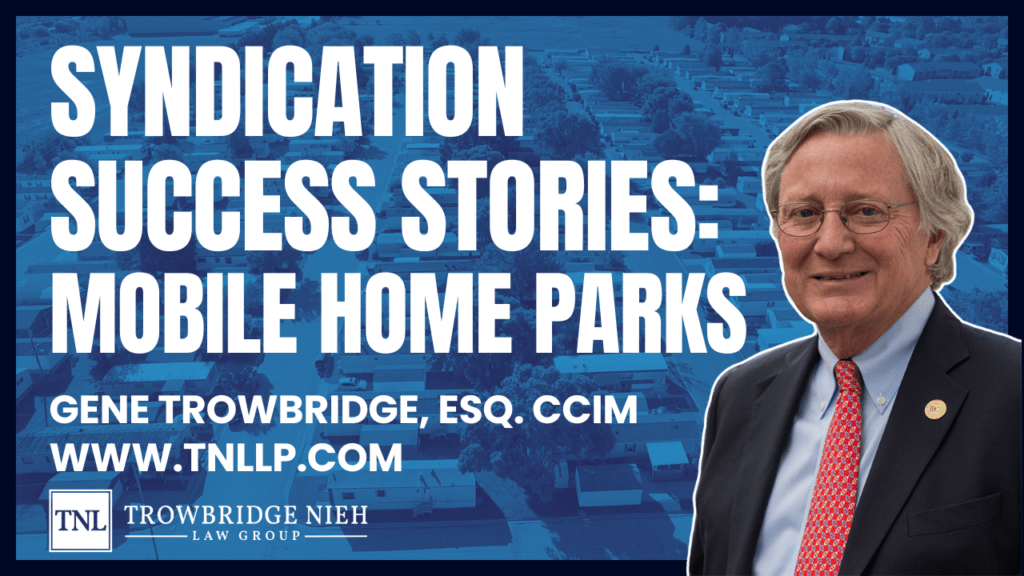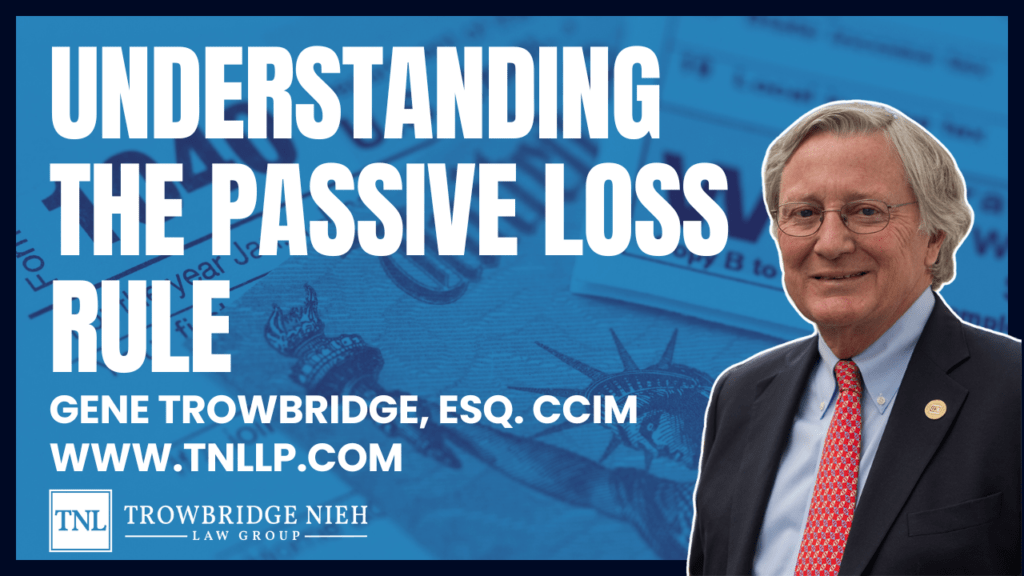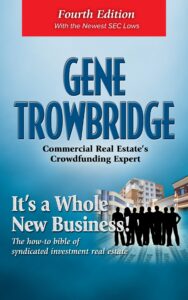In our inaugural TLG Talks!, host Gene Trowbridge, Esq. CCIM interviews his most prolific syndications client, James Hopper.
Gene and Jim discuss Jim’s long history as an experienced and successful real estate syndicator.
Learn more about Jim and AMC Investments by visiting https://www.amcinvestments.com/
Learn more about the services our firm provides at www.TrowbridgeLawGroup.com
Transcript
 | Gene Trowbridge, Esq. | Well, welcome everyone to this edition of TLG talks, our series of interviews with people who have made an impression in the syndication and crowdfunding world. I'm Gene Trowbridge, I'm the founding partner of the Trowbridge Law Group, and today I'm very excited to have as my guest, Jim Hopper. Jim is the President of AMC Investments, and even though this isn't an advertisement for either one of us, Jim is my most prolific syndicator client. Many of you listen to my podcast and some of the other things we do, and every once in a while, I talk about a syndicator who we've done over 100 offerings for and does nothing but 506b offerings with accredited investors. And this is the man. And we're lucky, we're doubly lucky to be talking to Jim today. But first of all, let's say good morning, Jim. |
                   | James Hoppper | Good morning. Thank you for inviting me. |
               | Gene Trowbridge, Esq. | Well, I think this is great. Those of you who are watching, you might see a little difference in the pictures. I don't wanna go into it too far, but this is not like the picture on my screen over here isn't 40 years old, and this is today's Jim. Jim has been recovering successfully from some cancer operation. And we can't see it, but there is some of that hair growing back and we all wish him well. In fact, he wanted to know if putting this picture that I have of him on the screen with all that hair was false advertising. And I told him, I didn't know how many women were watching so I didn't know if it made any difference. So Jim, instead of going through a biography, I'm gonna talk about a couple of ways that you and I have things that we have in common. You were with Western Federal Savings and you were in charge of loans for multifamily, and whatever. What did you do for Western Federal? |
                   | James Hoppper | I ran the multifamily commercial REO department. |
               | Gene Trowbridge, Esq. | Right. And at that same time, I was a broker and I was selling properties for Cal Fed. All their REO properties down here in Newport Beach, most of them were buildings that were situated on Irvine company land leases. And so we were doing that basically at the same time. But before you did that, in 1983, I believe, you started AMC. And did you start that as a syndication business? |
                   | James Hoppper | No, actually I was in a partnership with two guys, one ended up being the president of Coast Federal Savings, and another was accountant with Peat Marwick and we were buying unfinished house, and residential, and condo projects in Los Angeles. And so we would go in and we would buy 30 houses or whatever, and then we had a unique platform where we sold them with 1% down and the banks financed 90%. And we went through about 400 of these. And the reason we were able to do it, if I would have gone in as a broker, they would have think I was trying to scam them with 90% debt and 1% down. But with my two partners, one who was a senior executive at savings and loan, they knew him, and we had Peat Marwick, where my other partner worked do an analysis and provide documentation that what we were doing was legal. So the S&Ls that we were working in, their rear-ends were covered from a legal standpoint. So we just went through with the relationships they had through 400 of these. |
                   | James Hoppper | And then when that ended, I took the... Well, the RTC came in. I went to work for Western Federal in '92 because I had done 200 transactions with Western Federal, and they wanted me to come in and run the REO department. They said they had a short-term problem, and they were right. It was short-term because about 18 months later, the RTC came in and we couldn't sell the assets fast enough and took over, and I was one of two senior executives that stayed on and worked through the RTC to sell out the last couple of hundred million dollars in product that we had. |
               | Gene Trowbridge, Esq. | That was quite a time dealing with all that in the RTC and everything. So it seems that in 1995 about there, you went on to do workouts, and when did you actually start being a syndicator, taking other people's money and buying properties? |
                   | James Hoppper | Well, doing what I'm doing now then but I really got started because when I was in college, I read a book by a guy named William Nickerson, that was How I Turned $1,000 into Five Million in Real Estate, which is basically buying fixer-uppers and selling them. And so I thought, Well, I should do that, except I didn't have any money. And so I took eight of us, seven of which put in $250 each, so we had $1750. And the other one was a kid that I went to high school with who was in law school, so we gave him a free share for doing the legal work. And with the $1750, we bought a house in Modesto where I grew up. And for $11,000 it had positive cash flow and we sold it a couple of years later for 13. And then we bought a four-plex in Salinas where I was teaching school. And so that just kept going, and going, and going. So we were using my partners' money. If we needed more, we all pay in a little bit more, and then I was in the real estate business. |
                   | James Hoppper | And then once I got out of that and was doing the workouts, I did a great resolution for a guy, and he goes, Jim, this is really good, but I can't pay you. And I said, Well, you know, that sucks. The good news and the bad news for me is my wife runs the financial side of our business and so if she would have worked some place else or been a stay-at-home wife, I would have gone home. She would have said, How was your day? I would have said, It's okay. But instead, I walk in the door and she goes, So where's the check? And it's kind of like being in a narrow hallway when a shot gun goes off. You really can't avoid all those BBs, and so we had a corporate meeting, which was her and I, and we just decided that if we were gonna work on somebody's project, we would do it ourselves. And we would go to friends and family, and I didn't know if I could raise 50 cents or $50 million, and we've... |
                   | James Hoppper | I was sure of both 'cause I had 50 cents and I knew I couldn't raise 50 million, but we started out with our first little project was in an office building in San Pedro that we bought for $300,000, and that was probably the hardest $45,000 that I ever raised because everybody that knew me knew me as the executive at Western Federal, so they go, You're really a smart guy, and we know you know, but how do we know you can manage? How do we know you can do this? And so we were raising $2500 at a time. And so that just went on over the years, and we grew and grew and grew, and now we've done more than $4 billion in transactions and raised close to a billion dollars in investor money. |
               | Gene Trowbridge, Esq. | Yeah. It's amazing when I see what's going on at your company as we've grown together since early 2014 when we started working together. You said two things that are some of my favorite, two favorite sayings. In one way or another, you said this. And one of them is that the reason people become syndicators is they don't have enough money of their own to buy all the real estate they'd like to own, so they have to go to other people. I did the same thing. I was tired of owning single family houses, and I thought maybe if I could buy an apartment building. So in St. Paul, in 1977, we were a little richer than you were, we all put in $10,000 and we had $40,000 and bought a 10-unit apartment building paid cash. And I'm on my way as a syndicator. And the second saying that I love, and it is so true, is that all the great decisions in life were made around the kitchen table, and that's where you and your wife decided if you were gonna do this you were gonna be in charge. And that's where I decided that I would leave the syndication business after I had a good run and go to law school, so I always say that. |
               | Gene Trowbridge, Esq. | So what you do in your business is you look for locations, you look for geography, you look for operators in good locations who have projects, and then you step in and provide the funding, the project gets completed and you step out. You're never really in any of these projects for what I would call extremely long-term holds, 10, 15 years. That's not your business. That's a good business. And from what I've seen, Jim, you raise... Oh, I don't know, $3-7 million at a time. Yeah, that's about it. So that's a good pattern. So given that pattern and having done over 100 deals with my office since 2014, Jim, what do you see for the next three years in the business? |
                   | James Hoppper | Well, that's an interesting question because if you would have asked me that a year ago before this pandemic hit, then it would have been probably a different answer. Since the shutdown, we've been really busy. We're not seeing that there's... People thought that this was gonna be like the RTC days where everybody was buying properties at extreme discounts and that kind of stuff, and I'm not really seeing that out there on the properties that we're looking at. We've got, as you said, we've got great partners. We decided after the 2008-2009 downturn that rather than us going out and having relationships with brokers and negotiating properties and buying them and signing the loans and doing all that kind of stuff, that we would do is find the area we wanted to be in, the niche, the asset type that we wanted within that market, and then we would go find the best partners that we could, and we would join venture with them, as you said, but with us providing the majority of equity. So that's not gonna change. |
                   | James Hoppper | From one of the things, if you ask what I do best, I'm a bridge builder. If you're on one shore and wanna get to the other, my mind seems to work to be able to figure out a way to make a bridge to go across that. So as we see the world turn and change, our business may change from being the primary equity to some sort of preferred debt. If we don't like the way the pricing is, then we try to do preferred debt, which gets us down in the capital stack to a point where we don't feel that we have risk. We're willing to take a lower return for less risk. These projects that come in and they go, they're 40%, 50% IRRs, I just shake my head because anybody that thinks you can do those without risk is kidding themselves. And so we try to work with great partners, and we have a really strong following of investors. We have more than 1500 investors that have invested with us. And as a result, since we've had pretty good results in our projects that people are anxious to invest. I don't see that changing. I think that we may look at different areas. Right now we're in Austin, and Dallas, and Phoenix, and Portland area, Seattle. I don't see that changing. We've done Las Vegas. We just sold one of our two assets in Las Vegas. We've talked about Salt Lake City. I try to stay within a three-hour plane ride. |
                   | James Hoppper | We did a bunch of business in North Carolina and we were successful at that, but it's just too far. I am of the opinion that I can't buy something I don't see, and I haven't looked at, and I don't understand the market, and I just don't have time to go back that far and do it. So I see us doing the same thing. I think that I don't wanna be in markets where I am buying retail, or office type products because I think that they're gonna have significant problems now that people have figured out that they can work from home. But I think that even the COVID market might have a positive impact on multifamily, because if people are working from home, they're looking for a nicer place to live and maybe with some extra room for an office or whatever. And the markets we're in, the occupancy is high. We're not seeing, except in a few isolated cases that payments are an issue. We've been collecting more than 90% of our rents. And so I don't see that changing. I think that most everything I read and the people I talk to seem to think that in a year or so, the market will be stronger than it is today, but I don't see any weakness there today right now. |
               | Gene Trowbridge, Esq. | So over the last year or two, I've noticed that you brought some offerings out that vary a little bit from the standard multifamily, or micro-tower, or some student-housing type of projects. Do you see yourself doing more of that? |
                   | James Hoppper | I'm a big believer, especially in the political arena that we're seeing today in workforce housing and affordable housing. As an example of when I said we try to find the niche we wanna be in, we decided we wanted to be in micro-housing, and the logic is really easy. We bought our first one in Portland, in the Pearl District, which is where the millennials live. They used to party and go out and all the clubs and restaurants are there, but if you wanna rent a relatively nice one bedroom it's two grand a month. And so if you wanna live there and can't afford that, then a micro-unit is $1200 or $1300 a month. And so it's just simply an affordability issue. And we see a lot of older people that are wanting to retire and cut down on their expenses. So we bought the first one in Portland. And then we started doing analysis and the company that started the concept of micro-units was in Seattle, and the guy that owned that company died. His wife didn't wanna continue it. So the gal that was the president and their chief architect formed a business. They're Koz, K-O-Z, and Koz has done more micro-projects than anybody else in the Pacific Northwest. So we met with them and we're now their equity. |
                   | James Hoppper | We've done eight or 10 projects with them all ground-up constructions. And so again, we try to find the product we want and the areas we want, and then who are the best people. I see us doing a lot of micro-housing projects. We're trying to expand that into Austin, where pricing is really high, and even though I don't really want to, California, where I think if we could get the city planners and approval department to move quickly and not have so much in fees and costs, I mean, we have a huge demand here in Southern California for affordable housing. |
               | Gene Trowbridge, Esq. | Yeah. That makes sense. That's a great story you have to tell, and once again, I appreciate that you came on and have been sharing it with me and the people who will be listening to this when we re-broadcast this sometime right after Labor Day. So the last question I asked you to think about is, What advice do you have for the rookie who's getting into the syndication business? Maybe they haven't done their first deal or they've just done their first deal, and they're wondering, What the hell did I get into? What advice would you have, Jim? |
                   | James Hoppper | Well, I would say a couple of things. One is, you need to be way over the top on being fully transparent with your investors, and when you write your PPM, you need to make sure that you're not over-projecting. It's always better to under-project and over-produce. I learned a long time ago that if you say that you think that your investors are gonna earn $2 and they make 1.98, they think they somehow got shafted. But if you tell them that they're gonna make 1.75 and they get 1.98 they just think they got what they deserve. So there's a big difference in the same result. And so I would say when you're writing that be just straight up. Don't try to make a deal with people just to have a property that you can go do. And I would say that if you wanna get started and you weren't sure what to do or how to do it, that maybe you talk to somebody, one of the people that you work with, or us or whatever, and say, Hey, I've got this thing, I don't know how to do it. And maybe we can work out something that we could help you through it with advice or either consulting or whatever. But I think the hardest thing is, people tend to wanna oversell, and that's not how... We have repeat investors because they believe what we tell them. It has very little to do with the properties and stuff. They are what they are, but we've gained a reputation with... In all these years of working with people that they know that we're not gonna tell them something that we don't believe is true. |
               | Gene Trowbridge, Esq. | Right. You know I do a lot of mentoring with syndicators, and I'm able to answer their questions about advice 'cause I was there once, and I made all the mistakes and I've seen more mistakes, so that's all good, but I have gotten into the habit of not using the word sell. I've gotten into the habit of telling my people that what they really need to do is to explain to the people that know them... And that's who's gonna invest with you the first couple of times, your set spheres of influence, that you found an opportunity, and you're not gonna take the opportunity all by yourself, you're gonna create positions for people to take part in the opportunity, and look at it that way. I learned when I was raising money, Jim, that I used to... Boy, I used to get that private placement memorandum and go out and hammer people to try to get them to buy, and I have learned that we kinda work from the top down now. |
               | Gene Trowbridge, Esq. | I have a session that I do called, Selling the Sizzle, where I talk about finding people who are interested in real estate, then finding people who are interested in your part of the real estate world where you think you found opportunities and you think you've found some solution for these opportunities, and then finding people who agree that you have a team that can actually capture the opportunities that are out there and put your plan into effect. And then finally, when you get to the offering, Jim, there's really not much selling, not really much selling at that time. I think that's what it is. Any parting piece of advice before we say goodbye? |
                   | James Hoppper | No, I don't think so. I love the world we're in in terms of challenges and that kind of stuff, 'cause I think that challenges always create opportunity for those that can figure out a way to navigate in them, so it's what makes our business fun. |
               | Gene Trowbridge, Esq. | Well, I will tell you one last thing that I've noticed is I've had more calls in the last four months from experienced clients of mine who are contemplating doing a blind pool because they think there's gonna be blood in the streets. And as you said earlier, I don't know, and I don't know what product type... I don't feel that confident that there will be blood in the streets per se in the residential world, in the multifamily world, and what you're in. I'm a long way from retail expertise today and office building expertise. We do multifamily mobile home parks, a lot of business in mobile home parks, RV parks, because of my background in self-storage, and I don't know if I'm gonna see blood in the streets in those product types. It depends on so many things. |
                   | James Hoppper | And it's hard on those product types because when you say, Alright, well, I'm gonna buy it at a discount. Well how do you know what the discount is? 'Cause if have an office building and people are moving out because they don't have a need for space, how are you gonna lease it? |
               | Gene Trowbridge, Esq. | And how do you know when you're in the bottom of the market? That's the problem. We knew in 2008, we knew what was going on, and we'd both been in the business. I'd been '81, '87, '94, I'd been in it, we all kind of could see where the bottom is, and I don't think we have that clarity today. |
                   | James Hoppper | Yeah. The other thing I would say to the people that haven't done syndications before, in regards to your blind pool concept, is we basically don't do blind pools, and the reason is because most of my investors invest a certain amount, that I could tell you almost... I've had one guy who happened to be the other person that I mentioned that was... He ran special assets at Western Federal, so I ran the RA department and he ran special assets. He's been in more than 160 transactions with me. And so you can just put him down for $50,000 every time, but if I do a blind pool and I'm gonna put three or four properties in there or 10 properties that I would do individual ones for, say if I was gonna do 10, he would put in $50,000 10 times. If I do a blind pool, he's gonna put in $50,000 one time. So I lose the buy-in power by doing a blind pool. Plus people like to know what they're investing in, especially if you're starting out a buy-in pool would be very difficult because people would be unsure of your ability to do it. And now you're telling them, I'm gonna take all this money and I'm gonna buy 10 of them. So if there's a problem, there's really a problem if you don't know what you're doing. |
               | Gene Trowbridge, Esq. | That's right. My mentoring tells them, Don't even think about it unless you have a track record. And you of all people have a great track record and you don't even wanna do it, so it just adds risk to the position of being the managing member and there's plenty of risk anyhow. Alright, well, we've taken our half hour. I appreciate your time and continue. Good luck with your hair growing in and all the things that you have to do with your recovery, and hope that we all get back, and I'll be able to come to the office sometime, and you can take me to the club for lunch. |
                   | James Hoppper | Cool. I look forward to it. |
               | Gene Trowbridge, Esq. | Thank you, Jim. |
                   | James Hoppper | Thanks, Gene. |





